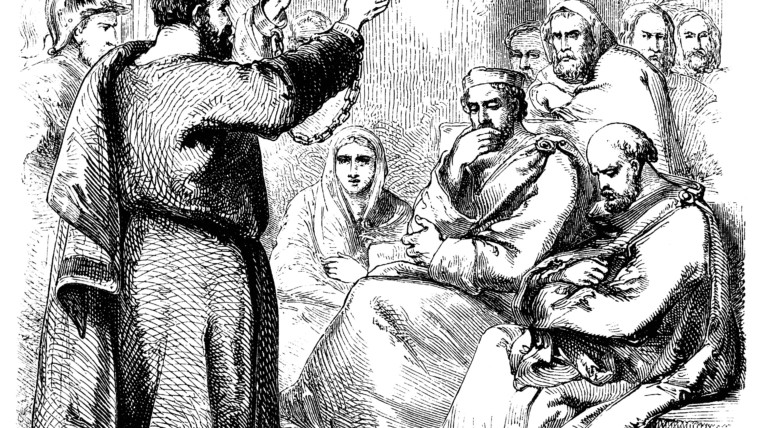Beware of Translator Bias!
by Christine Egbert
Bias means to skew or slant. It is my contention that over the centuries, in order to promote their own denominational doctrines, many Bible translators have chosen less than accurate words. In this article, I will list but a few slanted translations I have found.
Ekklesia
One would assume that the English word translated as “church” came from the Greek word kyriakon, for kyriakon literally means: “the Lord’s House, a meeting place for any religious group.” Yet, that is not the case. As a matter of fact, the word kyriakon does not appear in the Greek manuscripts. The word ekklesia, which is defined as “a called-out religious congregation or assembly”, does.
In spite of these facts, the English 1611 KJV translated ekklesia as church, and not by accident. It was King James’ decree. In 1604, the King of England, who was head of the English Church, decreed fifteen edicts that his translators must follow. Edict number three forbade ekklesia to be translated as congregation or assembly, even though it had been in every former Greek to English New Testament—the Tyndale Bible in 1524, the Coverdale Bible in 1535, the Matthew Bible in 1537, and the Great Bible in 1539. Prior to the King’s edict, only one English Bible had translated ekklesia as church, the 1382 Wycliff Bible, which was translated from the Latin (Catholic) Vulgate, not the Greek.
Anomia
Now let us examine the Greek word anomia. Thayer’s Bible dictionary defines anomia as: noun, as the condition of being without law, being ignorant of the law, violating the law, contempt of the law, iniquity, and wickedness.
The King James Bible and many other non-literal English translations render anomia and its varying forms—noun, adjective, adverb—as iniquity or wickedness. But iniquity and wickedness are extrapolations of the word lawlessness.
In the following verses, I will replace those extrapolations for the literal word. Then you can decide for yourself if the translators had an agenda.
Titus 2:14 – “Who gave Himself for us, that He might redeem us from all lawlessness, and purify unto Himself a peculiar people, zealous of good works.”
Romans 4:7 – “Saying, ‘Blessed are they whose lawlessness is forgiven and whose sins are covered.’”
Romans 6:19 – ”I speak after the manner of men because of the infirmity of your flesh. For as ye have yielded your members servants to uncleanness and to lawlessness unto lawlessness, even so now yield your members servants to righteousness unto holiness.”
2 Corinthians 6:14 – “Be ye not unequally yoked together with unbelievers. For what fellowship hath righteousness with lawlessness?”
2 Thessalonians 2:7 – “For the mystery of lawlessness doth already work…”
Hebrews 1:9 – “Thou hast loved righteousness and hated lawlessness, therefore God, even thy God, hath anointed thee with the oil of gladness above thy fellows.”
Hebrews 10:17 – ”And their sins and lawlessness will I remember no more.”
Matthew 7:23 – “And then will I profess unto them, I never knew you. Depart from Me, ye that work lawlessness.”
Matthew 13:41 – “The Son of man shall send forth His angels, and they shall gather out of His kingdom all things that offend and them which do lawlessness.”
Matthew 23:28 – “Even so ye also outwardly appear righteous unto men but within ye are full of hypocrisy and lawlessness.”
Matthew 24:12 – “And because lawlessness shall abound, the love of many shall wax cold.”
Acts 2:47
The KJV translates Acts 2:47 as “And the Lord added to the church daily such as should be saved.” But “be saved” fails to reflect the Greek present tense in which it was written. Literally, it reads “are being saved.”
Epistrephō
Acts 3:19 says, “Repent ye therefore and be converted, that your sins may be blotted out when the times of refreshing shall come from the presence of the Lord.”
The Greek word epistrephō (ἐπιστρέφω – G1994), translated as “converted” is defined in Thayer Bible dictionary as “to turn to the worship of the true God; to return; to bring back to the love and obedience of God.”
Throughout Scripture God says, “Return to Me!”
Convert means quite the opposite. As defined by Miriam Webster Dictionary convert means “to bring over from one belief, view, or party to another.”
In the KJV the Greek word epistrephō is found 29 times in the Gospels (Matthew-Acts). Of those 29 times it is mistranslated 8 times, once as convert in James 5:19 and 7 times as converted—in Mathew 13:15; 18:13; 4:12; in Luke 22:32; in John 12:40; and in Acts 3:19; and 28:27.
In only 4 of the 29 translations of epistrephō does the KJV translate the word correctly as “turn or return” when it refers to God. One of those four places speaks of Israel returning to God.
Luke 1:16 “And many of the children of Israel shall he turn to the Lord their God.”
The second one speaks of John the Baptist turning Jews to God.
Luke 1:17 “And he shall go before Him in the spirit and power of Elias, to turn the hearts of the fathers to the children, and the disobedient to the wisdom of the just; to make ready a people prepared for the Lord.”
The other two of the four passages in which the KJV translated the word correctly as turn or return are these.
Acts 26:18, “To open their eyes and to turn them from darkness to light and from the power of Satan unto God…”
Acts 26:20. “But showed first unto them of Damascus, and at Jerusalem, and throughout all the coasts of Judaea, and then to the Gentiles, that they should repent and turn to God.”
Every other time (17 out of the 29) when the KJV translates epistrephō accurately as return it refers to a “physical change in position”, not a spiritual one.
Why did the translators do this? I believe it was to distance Christians from their Hebraic roots. Nevertheless, throughout Holy Scripture, God pleads over and over with His people, “Return to Me!”
Hebrew Word “tām”
Consider the Hebrew adjective tām (תָּם – H8535). Brown-Driver Briggs defines tām as: perfect, complete, one who lacks nothing in physical strength, beauty, sound, wholesome, quiet sort of person, complete, morally innocent, having integrity, one who is morally and ethically pure, and ordinary.
Tām appears a total of 13 times in the Hebrew Bible. King James translated it 9 times as perfect, twice as undefiled, and once as upright. The only time the KJV translators rendered tām as “plain” was in Genesis 25:27, where it was used to describe Jacob, the patriarch God renamed Israel.
Pesach
28 times in the Greek New Testament Pesach was translated correctly as Passover. Only in one strategic place, Acts 12:4 did the KJV translate Pesach as Easter. This holiday of pagan origin was mandated by the Roman Emperor Constantine to replace Passover in the 4th Century. So, what was Easter doing in Acts 12:4?
Hidden Agendas
Beware of hidden agendas revealed through biased word choices, so that knowing beforehand you will watch, “lest you be led away by the error of the lawless!” (2 Peter 3:17)



